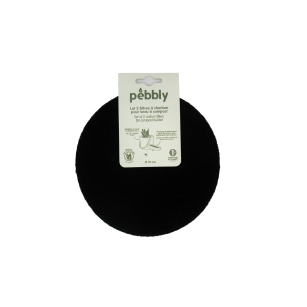

Set of 2 Charcoal Filters
Has your compost filter worn out or torn? Replace it easily with our compost filters!
Adopting the habit of composting with Pebbly means committing to an eco-friendly approach without compromise. With the assurance of effective odor-sealing, our compost bins streamline the composting process, whether you live in an apartment or a house, in urban or rural areas. Discover how to make your eco-conscious efforts just as simple while actively contributing to the reduction of organic waste on a daily basis.

Composting at home with a bio bucket or an indoor compost bin is an eco-friendly and responsible practice with multiple benefits. By recycling organic waste such as fruit and vegetable scraps, coffee grounds, and other compostable materials, we significantly reduce the amount of waste sent to landfills. This helps limit greenhouse gas emissions caused by their decomposition in an anaerobic environment. Composting also produces a natural fertilizer rich in nutrients, ideal for healthier and more environmentally friendly plants. By adopting this practice, everyone actively contributes to preserving biodiversity and creating a sustainable ecosystem while reducing their ecological footprint. It's a simple, accessible action with significant positive impacts for the future of our planet.
Starting January 1, 2024, composting will be mandatory for many households in France as part of efforts to reduce waste and promote a circular economy. Individuals will be required to manage their organic waste using individual or communal composting solutions. At Pebbly, we see this new requirement as a great opportunity to raise awareness about more sustainable and environmentally friendly practices. Preparing now with a bio bucket or an indoor compost bin, for example, is a first step toward an eco-responsible lifestyle that reduces the environmental impact of our daily waste.
In your indoor compost bin, you can dispose of all fruit and vegetable scraps, whether raw or cooked. Prepared foods, cooked and raw meats can also go into your bio bucket, as well as citrus peels and banana skins. Dairy products such as cheese and yogurt are accepted, along with eggs and small bones. Feel free to add stale bread, coffee grounds, tea bags, wilted flowers, and even a very small amount of paper tissues.
However, certain waste items should never be placed in your compost bin. All liquids should be avoided: vinegar, juice, sauces, milk, oil, and water. Also, avoid large bones, ashes, and pet waste. Materials such as paper, cardboard, plastic, glass, and metal do not belong in your bio bucket. Lastly, never dispose of medications, chemicals, or diseased plants in your indoor compost bin.
Charcoal filters for bio buckets or compost bins play a crucial role in limiting odors while ensuring proper airflow, which is essential for the decomposition of organic waste. By regularly maintaining your compost bin and replacing the filter, you can keep your kitchen fresh and odor-free. With proper care, indoor composting becomes practical and pleasant on a daily basis.
It is recommended to empty your bio bucket or indoor compost bin once a week outdoors to prevent accumulation and ensure effective composting. For cleaning, use hot water and dish soap, avoiding harsh chemical detergents. The charcoal filter should be cleaned regularly with warm soapy water by hand to prevent deterioration or shrinkage. By following these simple steps, you ensure clean and efficient composting.

French company
We are based in Bordeaux.

Secure payment
Credit card

Fast shipping
Your orders dispatched within 48 hours

Customer service
We respond within 48 hours